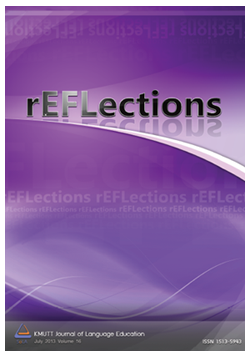Students’ Intuition-Based Self-Efficacy and Evidence-Based Self-Efficacy towards Their Oral Presentation
Main Article Content
Abstract
Self-efficacy has a profound effect on learners’ performance, especially, in speaking skills and oral presentations as they require many more skills other than language knowledge. This study aims to investigate students’ intuition-based and evidencebased self-efficacy in oral presentations. The study was conducted with 24 subjects. They were asked to do a questionnaire and to report their intuition-based selfefficacy in their oral presentations. Later, the same questionnaire was used to rate their self-efficacy after the actual performance. The results showed that the levels of intuition-based self-efficacy were significantly higher than that of evidence-based self-efficacy in all three components of the presentation: language, delivery and organization. Evidence from the students’ actual performance strongly affected their self-efficacy suggesting that there is a bidirectional relationship between them and that evidence plays important roles in improving students’ performance.


